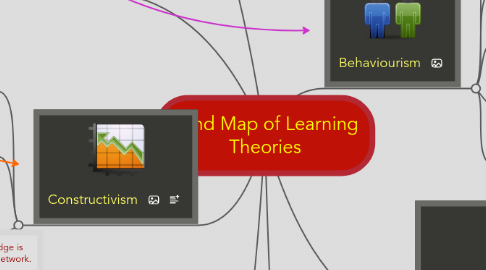
1. Constructivism
1.1. Acknowledge that learning is messy and complex.
1.2. "Learners create their knowledge as they attempt to understand their experiences". (Driscoll,2000, pg.376)
1.3. Suggests that learners are not empty vessels waiting to be filled with information. Different from behaviourism and cognitivism which suggest otherwise.
1.4. Acknowledges that learning is complex, thus when organized and focussed in the classrooms it is much more beneficial to the learner.
2. Connectivism
2.1. Personal knowledge is comprised as a network.
2.2. Learning and knowledge rests in a diversity of opinions.
2.3. Learning may be from non-human sources.
2.3.1. Examples: Through personal experiences, and observation.
2.4. Ability to see connections between concepts is a key skill.
2.5. Along with behaviourism, cognitivism and constructivism, connectivism does not acknowledge the challenges faced from organized knowledge and transference.
2.5.1. Sources may contain biases, and are unreliable.
3. TPACK (Technological, pedagogical, And Content Knowledge)
3.1. Pedagogical
3.1.1. "How" to teach.
3.1.1.1. Depending on what material is being taught, the teacher is well equipped and knowledgable regarding how to to properly present the information.
3.2. Content Knowledge
3.2.1. Capacity in which the educator is fluent with the material they are trying to teach.
3.3. Technological
3.3.1. Ability to use software and technology.
4. Philosophy of Teaching
4.1. Statements regarding your personal values/beliefs and the influence they have upon your own theories about learning.
4.1.1. Example 1: For myself, I believe that it is important to provide engaging and challenging material to the students, to help foster a desire to learn.
4.1.1.1. This philosophy would cause me to use more hands on work in the classroom, and thus effects the way in which I choose to teach my students.
4.1.2. Each persons philosophy is different.
4.1.2.1. Reflects in the way the teacher chooses to run a classroom.
5. Behaviourism
5.1. Based on a more scientific perspective.
5.2. Through observation experimentation rather than internal thoughts like thinking.
5.3. All behaviours develop through conditioning.
5.4. Similar to the constructivist theory of learning, behaviourism suggests that when born the mind is a blank slate ready to learn from the surroundings.
5.5. Pavlovs research: http://www.youtube.com/watch?v=hhqumfpxuzI
5.5.1. Surroundings and the environment determine our behaviour.
6. Cognitivism
6.1. Te process of converting symbolic mental constructs of short term memory to the long term memory system of the brain
6.1.1. 3 Ways in which long term memory is established:
6.1.1.1. 1. Knowledge compression
6.1.1.2. 2. Repetition
6.1.1.3. 3. Instructional Flow
6.1.2. The brain can only handle 7 disconnected pieces of information at a time.
6.1.3. By utilizing the 3 ways in which long term memory is established learning can be a much more efficient process in the classroom.
7. Theories of Technology
7.1. Media Ecology
7.1.1. The study of media environments that effect human affairs.
7.1.1.1. Technology, symbolic forms, codes, or art.
7.1.1.2. Technology
7.1.1.3. Symbolic forms
7.1.1.4. Codes
7.2. SCOT
7.2.1. Technology does not shape human actions, but human actions shapes technology.
7.2.2. Takes a look into the social networks to understand the reasons for acceptance/rejection of technology.
7.2.2.1. Traitions/ways of life/culture can effect technological acceptance.
7.2.3. How the criteria of being "The Best" is defined in society, and whom participates in the defining.
